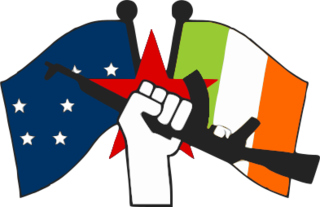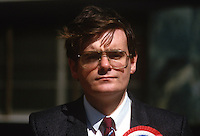
The Irish National Liberation Army is an Irish republican socialist paramilitary group formed on 8 December 1974, during the 30-year period of conflict known as "the Troubles". The group seeks to remove Northern Ireland from the United Kingdom and create a socialist republic encompassing all of Ireland. With membership estimated at 80–100 at their peak, it is the paramilitary wing of the Irish Republican Socialist Party (IRSP).

The Irish Citizen Army, or ICA, was a small paramilitary group of trained trade union volunteers from the Irish Transport and General Workers' Union (ITGWU) established in Dublin for the defence of workers' demonstrations from the Dublin Metropolitan Police. It was formed by James Larkin, James Connolly and Jack White on 23 November 1913. Other prominent members included Seán O'Casey, Constance Markievicz, Francis Sheehy-Skeffington, P. T. Daly and Kit Poole. In 1916, it took part in the Easter Rising, an armed insurrection aimed at ending British rule in Ireland.

The Irish Republican Socialist Party or IRSP is a minor communist, Marxist–Leninist and Irish republican party in Ireland. It is often referred to as the "political wing" of the Irish National Liberation Army (INLA) paramilitary group. It was founded by former members of Official Sinn Féin in 1974 during the Troubles, but claims the legacy of the Irish Socialist Republican Party of 1896–1904.

The Irish People's Liberation Organisation was a small Irish socialist republican paramilitary organisation formed in 1986 by disaffected and expelled members of the Irish National Liberation Army (INLA), whose factions coalesced in the aftermath of the supergrass trials. It developed a reputation for intra-republican and sectarian violence as well as criminality, before being forcibly disbanded by the Provisional Irish Republican Army (IRA) in 1992.
Jimmy Brown was a militant Irish republican and drug dealer who was a member of Fianna Eireann, the Official IRA, then Irish Republican Socialist Party (IRSP)/ Irish National Liberation Army (INLA), and latterly of the Irish People's Liberation Organisation (IPLO).
Samuel Ward was the leader of the Irish People's Liberation Organisation's Belfast Brigade. The IPLO was formed in 1986 by disaffected and expelled members of the Irish National Liberation Army. Following its split from and feud with the INLA, the IPLO split into two factions: the 'Army Council' and the 'Belfast Brigade'.
The republican movement refers to the Irish Republican Army (IRA) and other political, social and paramilitary organisations and movements associated with it. It can refer to:

George Seawright was a Scottish-born unionist politician in Northern Ireland and loyalist paramilitary in the Ulster Volunteer Force. He was assassinated by the Irish People's Liberation Organisation in 1987.
Gerard Steenson was an Irish republican paramilitary and a leader of the Irish People's Liberation Organization during The Troubles.
Henry Kirkpatrick is a former Irish National Liberation Army member turned informer against other members of the INLA.

Thomas Power was an Irish republican socialist, also known as Ta Power, who was a leading member of the Irish Republican Socialist Party (IRSP) and Irish National Liberation Army (INLA). According to the Irish Republican Socialist Movement (IRSM) biography page on Power, he was from Friendly Street in the Markets area of south Belfast, where he had become an activist. He had originally joined the Official IRA but transferred allegiance to the INLA in 1975 while a prisoner in Long Kesh, along with 20 other men.
Hugh Torney was an Irish National Liberation Army (INLA) paramilitary leader best known for his activities on behalf of the INLA and Irish Republican Socialist Party (IRSP) in a feud with the Irish People's Liberation Organisation (IPLO), a grouping composed of disgruntled former INLA members, in the mid-1980s.
Dessie O'Hare, also known as "The Border Fox", is an Irish republican paramilitary who was once the most wanted man in Ireland.

Left-wing terrorism or far-left terrorism is terrorism motivated by left-wing or far-left ideologies, committed with the aim of overthrowing current capitalist systems and replacing them with communist or socialist societies. Left-wing terrorism can also occur within already socialist states as criminal action against the current ruling government.
William McMillen, aka Liam McMillen, was an Irish republican activist and an officer of the Official Irish Republican Army (OIRA) from Belfast, Northern Ireland. He was killed in 1975, in a feud with the Irish National Liberation Army (INLA).
A volunteer is a member of various Irish republican paramilitary organisations. Among these have been the various forms of the Irish Republican Army (IRA), the Irish National Liberation Army (INLA), and the Irish People's Liberation Organization (IPLO). Óglach is the equivalent title in the Irish language.
John "Bunter" Graham is a long-standing prominent Ulster loyalist figure. Born in the Lower Shankill, Graham rose quickly through the ranks of the Ulster Volunteer Force (UVF), joining other UVF leaders at a rally at Stormont in 1974 to celebrate the collapse of power sharing.
The Official IRA's Belfast Brigade was founded in December 1969 after the Official IRA itself emerged in December 1969, shortly after the beginning of the Troubles, when the Irish Republican Army split into two factions. The other was the Provisional IRA. The "Officials" were Marxist-Leninists and worked to form a united front with other Irish communist groups, named the Irish National Liberation Front (NLF). The Brigade like the pre-split IRA brigade before the split had three battalions, one in West Belfast, one in North Belfast and the third in East Belfast. The Belfast Brigade was involved in most of the biggest early confrontations of the conflict like the Falls Curfew in 1970, the battles that followed after the introduction of Internment without trial in 1971 and Volunteers joined forces with the Provisional brigade to fight the British Army and UVF during the Battle at Springmartin in 1972. The first Commanding Officer (CO) of the brigade was veteran Billy McMillen who fought during the IRA Border Campaign. Shortly after the death of Official IRA Belfast "Staff Captain" Joe McCann in April 1972, the battalion structure of the brigade was done away with and command centralized under McMillen.

The Irish National Liberation Army Belfast Brigade was the main brigade area of the Irish National Liberation Army (INLA). The other Brigade areas were in Derry which was split between two battalions, the first in Derry City, and the second battalion in south County Londonderry and County Armagh which was also split into two battalions, a south Armagh and a north Armagh battalion, with smaller units in Newry, east and west County Tyrone and south County Fermanagh.
Martin "Rook" O'Prey was an Irish republican and a Volunteer in both Irish republican and Revolutionary socialist paramilitary groups, first the Irish National Liberation Army (INLA) and later the Irish People's Liberation Organisation (IPLO). He was killed by Ulster Loyalist paramilitaries from the Ulster Volunteer Force (UVF) in August 1991.








